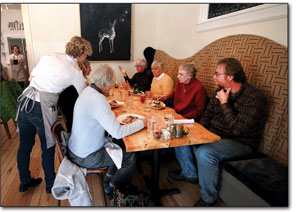
Clearing the plate
Restaurateur looks to make fresh start after labor infractions
side bar: The tipping point: Servers discuss approaches to pooling, splitting tips
Two-thousand-and-fourteen was a trying year for Alison Dance, long-time proprietress of the popular downtown eatery the Cyprus Café. In the spring, she was audited by the state Department of Labor Wage and Hour Division on charges of payroll infractions.
Precipitated by employees she refers to as “disgruntled,” Dance was notified by the department that an investigation would be conducted at her establishment to determine whether Cyprus Café employees’ wages were in compliance with state and federal codes.
 Diners fill a table for lunch time at Cyprus Cafe. The interior was designed and built by Jeremy and Chrissy Fuller./Photo by Jennaye Derge |
Rectifying the situation proved stressful and costly, and Dance considered shuttering the doors once she met her obligations. However, once back wages were paid and the experience behind her, Dance decided to remodel the interior of her popular establishment and start afresh, including a reinvigorated menu.
Hoping to set the record straight and explain her side of the story, Dance recently shared the outcome of that audit and talked about her experience.
Prompted by employee complaints, one intention of the labor investigation was to verify Cyprus’ compliance with what is known as Wage Order 30 of the DOL. Dance required servers to tip out kitchen staff, and as such, under Wage Order 30, these tips could no longer be counted toward a server’s minimum wage.
Also known as “tip credit,” like many government compliance laws, the term is one of several that may easily lead to confusion. In restaurants, employees who earn tips and gratuities must be paid a cash wage of at least $4.98 per hour if they claim a tip credit against their minimum wage, which is currently $8 per hour.
The caveat is if the employee’s tips plus the hourly wage do not equal the minimum wage, the employer must make up the difference. According to the DOL, this is calculated on a weekly basis.
Bewildered? You are not alone. The policy is confusing on its own, but is made more complex when the tipped employees are asked to contribute a percentage to the kitchen staff. This is not an uncommon practice, but in most cases it is voluntary. Add to that process deducting a percentage of credit card fees paid by the employer when the tip is added to the bill, and it can become a bookkeeping nightmare.
Problematic as that is, the determination of overtime pay is also a major headache, since many restaurant employees fail to clock out when they are supposed to or neglect to notify management when they put in extra hours. Another focus of the Cyprus Cafe inquiry was to determine if overtime hours were accurately recorded and employers compensated for the additional time they worked.
Like many restaurants, Cyprus utilizes a payroll system called Aloha, which records time-in, time-out of all hourly employees. However, if an employee neglects to clock out, the system ends each day at 3 a.m. and that is what will show up on the employee’s record. Without adequate recording of overtime hours, the owner is often left to his or her own determination. It is easy to understand how differences of opinion might arise.
The system used by the Cyprus retains a file of records for four years and was a key tool in the investigation that ultimately led to the discovery of glaring discrepancies.
In this week's issue...
- December 18, 2025
- Let it snow
Although ski areas across the West have taken a hit, there’s still hope
- December 18, 2025
- Look, but don't take
Lessons in pottery theft – and remorse – from SW Colorado
- December 11, 2025
- Big plans
Whole Foods, 270 apartments could be coming to Durango Mall parcel
